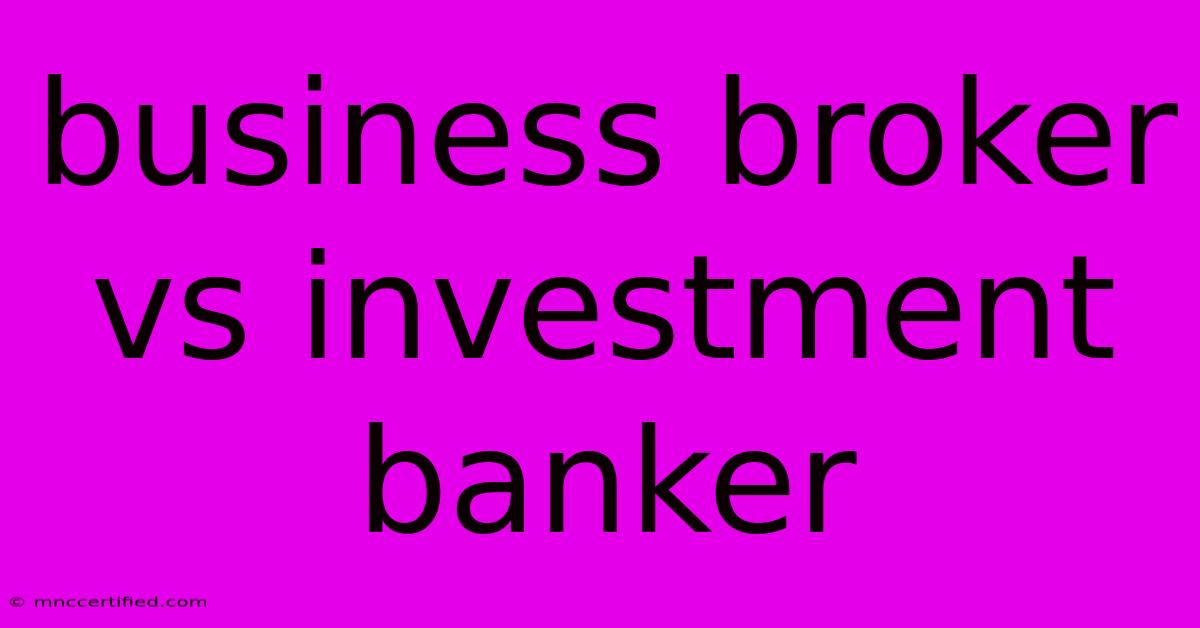Business Broker Vs Investment Banker

Table of Contents
Business Broker vs. Investment Banker: Which One Do You Need?
Selling a business is a major decision, and choosing the right professional to guide you through the process is crucial. Two common options are business brokers and investment bankers. While they both assist in facilitating transactions, their roles, expertise, and target markets differ significantly.
This article will break down the key differences between these two professionals, helping you understand who best suits your specific needs.
Business Brokers: The Small and Medium-Sized Enterprise (SME) Specialists
Business brokers primarily specialize in facilitating the sale of small to medium-sized businesses (SMEs). They typically handle transactions valued under $50 million and often focus on industries like retail, restaurants, service businesses, and manufacturing.
Here's what business brokers excel at:
- Market Knowledge: They have extensive experience navigating the local market and understanding the specific challenges and opportunities faced by businesses in their chosen industry.
- Buyer Network: Business brokers build a network of potential buyers looking for businesses like yours, increasing the chances of a successful sale.
- Valuation Expertise: They utilize a range of methods to determine a fair market value for your business, ensuring you receive an appropriate price.
- Negotiation Skills: Business brokers are skilled negotiators, ensuring a smooth and fair transaction for both buyer and seller.
- Comprehensive Support: From preparing marketing materials to handling due diligence and closing the deal, business brokers provide end-to-end guidance and support.
When to Choose a Business Broker:
- You own a small to medium-sized business, ideally with a revenue under $50 million.
- You require hands-on support and guidance throughout the entire sales process.
- You're looking for a local expert with a strong understanding of your industry.
Investment Bankers: The Heavyweights of Large-Scale Transactions
Investment bankers operate in a different league, typically handling transactions involving large, complex businesses with revenues exceeding $50 million. They specialize in mergers and acquisitions (M&A), private equity deals, and other high-value transactions.
Investment bankers bring unique skills and expertise to the table:
- Sophisticated Valuation Techniques: Investment bankers utilize advanced valuation methods, incorporating complex financial modeling and market analysis to determine the precise value of your business.
- Extensive Deal Experience: They have a proven track record of successfully navigating complex transactions, often involving multiple parties and challenging legal frameworks.
- Global Reach: Investment bankers have a global network of potential buyers and investors, opening doors to international opportunities.
- Strategic Insights: They can provide strategic guidance on deal structuring, negotiation tactics, and post-acquisition integration.
When to Choose an Investment Banker:
- You own a large and complex business with significant revenue and assets.
- You're looking for strategic advice and guidance beyond just facilitating a sale.
- You need access to a global network of potential buyers and investors.
Comparing the Costs: Business Brokers vs. Investment Bankers
The fees associated with hiring a business broker or an investment banker are structured differently. Business brokers typically charge a commission based on a percentage of the final sale price, ranging from 5% to 10%. Investment bankers work on a fixed fee basis or a combination of fixed fees and success-based commissions that vary depending on the deal size and complexity.
Finding the Right Fit:
Ultimately, the best choice depends on your specific needs and the nature of your business. Consider these factors:
- Size and Complexity of Your Business: If you have a small to medium-sized business, a business broker is likely the better choice. For large, complex businesses, an investment banker offers the necessary expertise and global reach.
- Your Budget: Business brokers are generally more affordable than investment bankers, making them a good option for smaller businesses.
- Your Time Commitment: If you prefer a hands-off approach, an investment banker might be a better fit. Business brokers require more involvement from the seller throughout the process.
Remember: Seeking advice from multiple professionals can help you gain valuable insights and make an informed decision. Don't hesitate to contact both business brokers and investment bankers to discuss your specific situation. By carefully weighing your options and choosing the right professional, you can increase your chances of a successful and profitable sale.

Thank you for visiting our website wich cover about Business Broker Vs Investment Banker. We hope the information provided has been useful to you. Feel free to contact us if you have any questions or need further assistance. See you next time and dont miss to bookmark.
Featured Posts
-
Blox Fruits Trading Value Calculator
Nov 12, 2024
-
Jones Sun Rant Right Or Wrong
Nov 12, 2024
-
Solar Lighting For Chain Link Fence
Nov 12, 2024
-
Yamal Lewandowski Out Barcelonas Lineup Hit
Nov 12, 2024
-
Metals And Mining Investment Banking
Nov 12, 2024